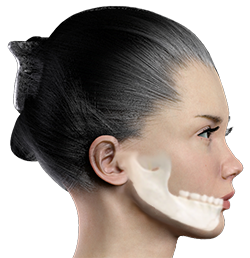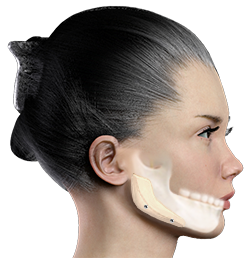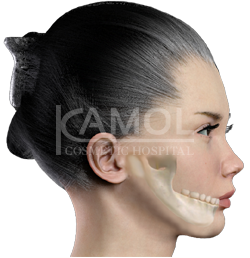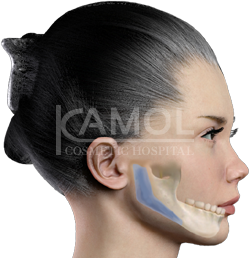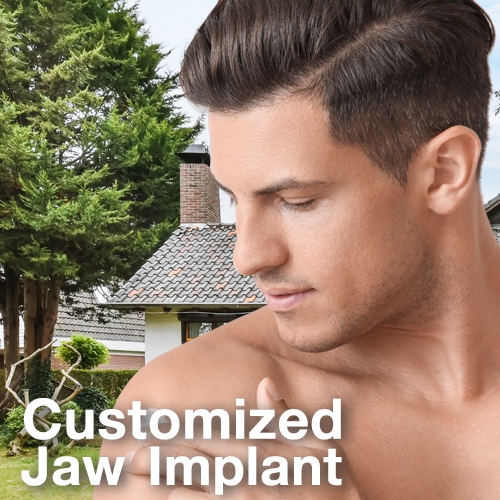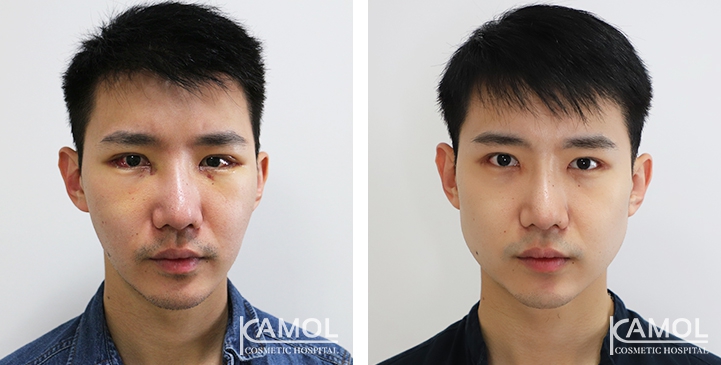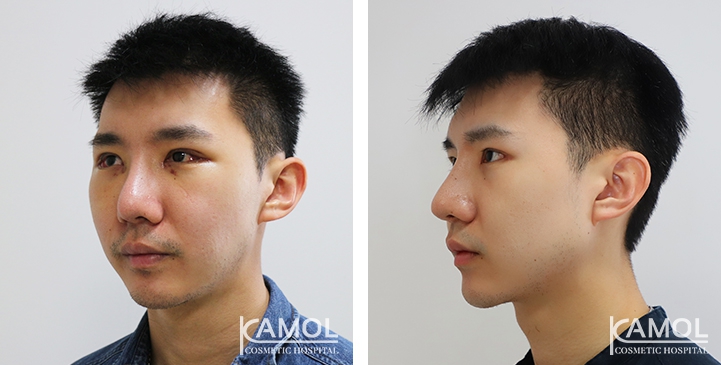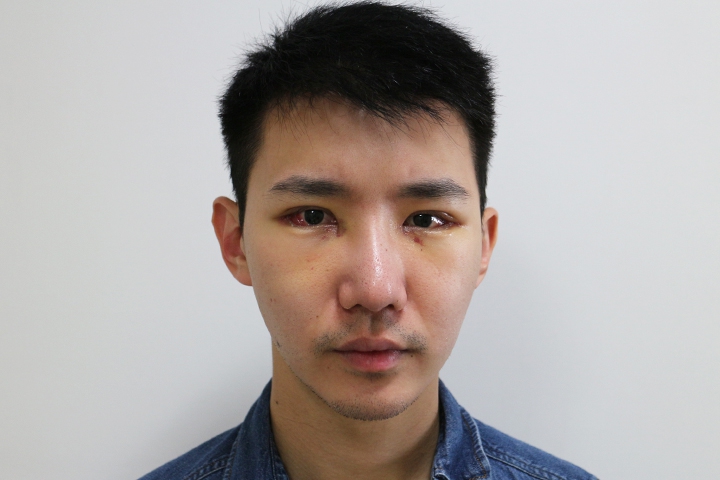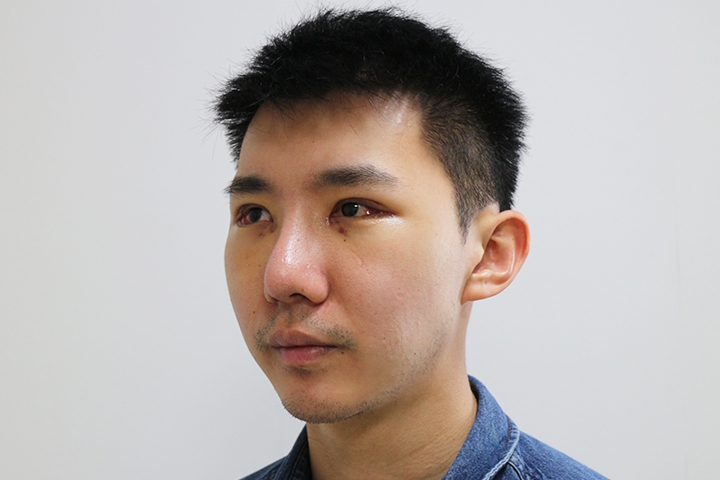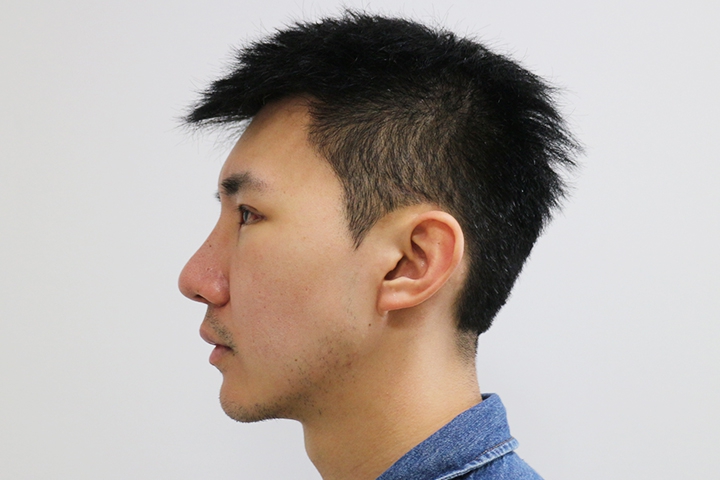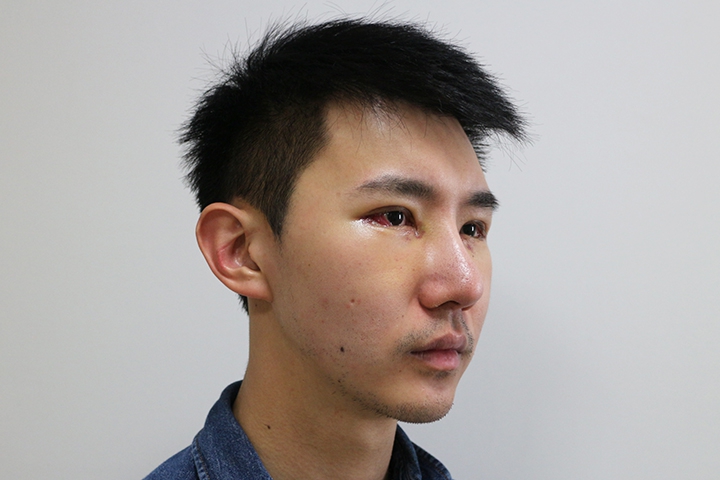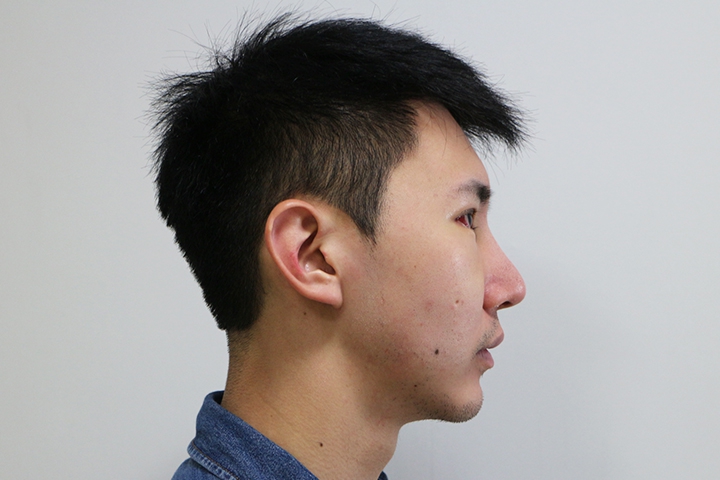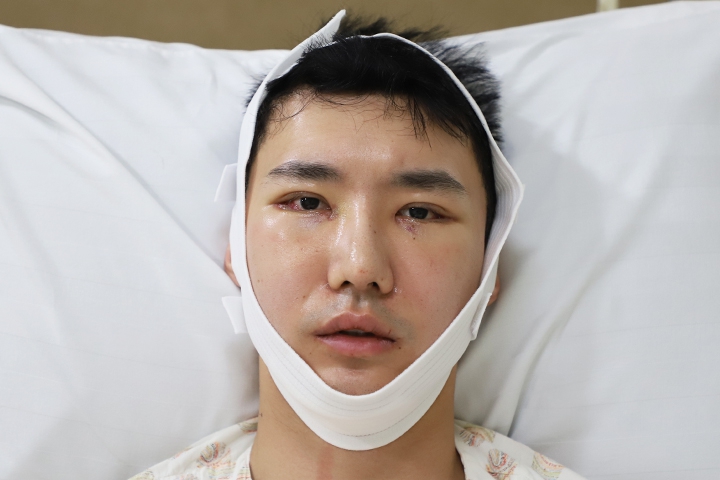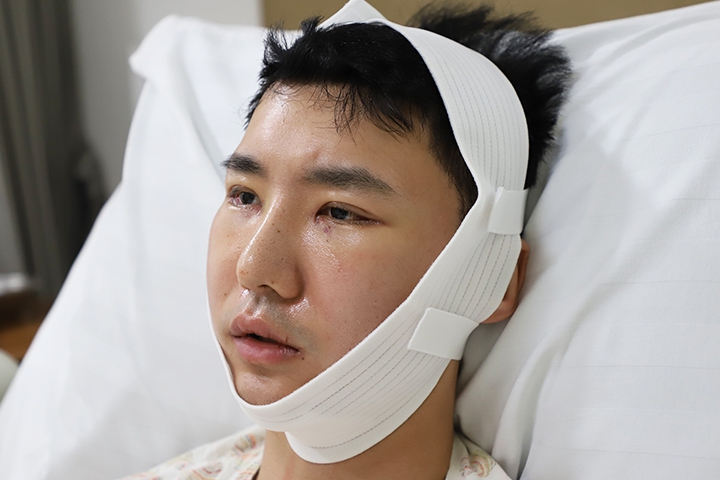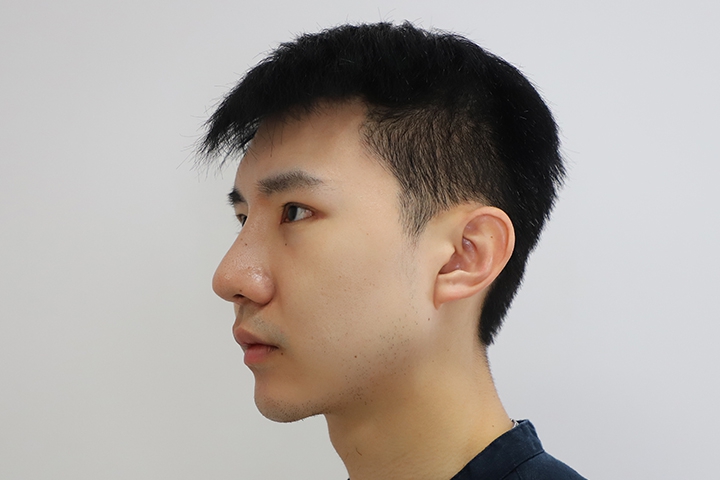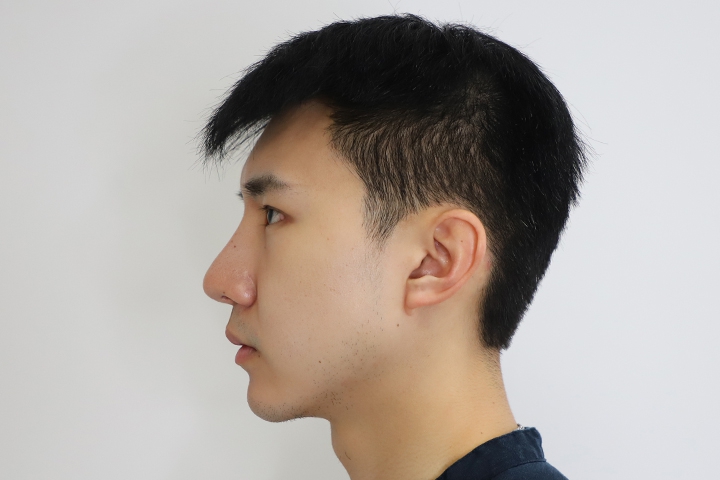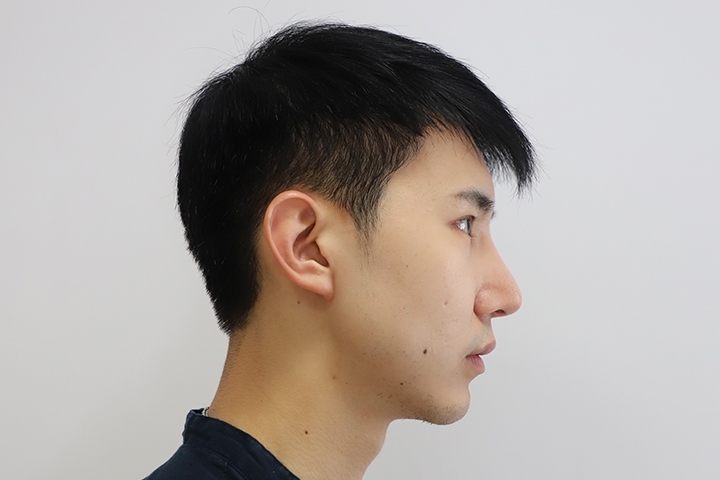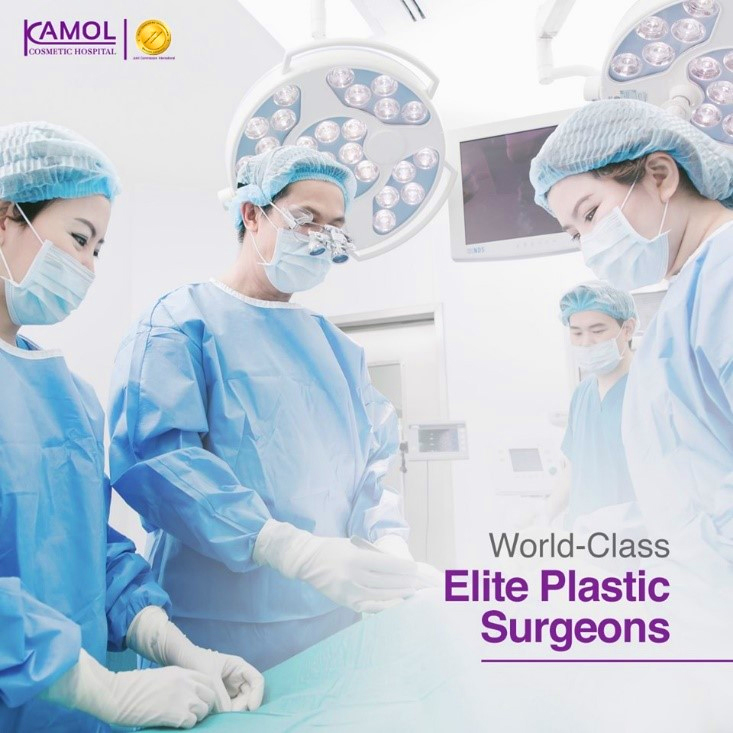Jaw Augmentation, Jaw Implant, Mandibular Augmentation:
In recent times, stronger jawlines have been sought because a strong natural jawline looks healthy and attractive in men and women. A strong jawline makes the face more masculine, while conversely, a less defined jawline appears feminine. Sometimes, women with a weak jawline want to be more balanced and defined. Some famous actresses like Angelina Jolie and Jennifer Aniston have very strong natural jawlines.
|
|
|
Material for Jaw Augmentation:
- Silicone
- PMMA Customized implant
A Good Candidate for Jaw Augmentation
- Men who have a narrow jaw.
- Women with a weak jawline.
- Healthy people.
- Those with realistic expectations
Preparation for Jaw Augmentation
- Physical examination or lab tests, chest X-ray, blood test, and EKG if you are over 40 years old.
- Stop smoking at least two weeks before surgery.
- Stop taking any anti-inflammatory drugs such as aspirin, Motrin, Ibuprofen Vitamins, or herbs that interfere with blood clotting at least two weeks before surgery.
- Plan for your recovery. Chewing will be difficult for up to a week after surgery. You should have some soup, liquid food, and meal supplements prepared.
|
|
|
Picture 1 Shows before and after surgery jaw augmentation
Jaw Augmentation Procedure:
- The patient is given a general anesthetic.
- Internal incisions are usually made directly inside the mouth on either side of the lower lip, meaning there is no external scar.
- A pocket is created that will hold the implant for an improved contour and a more defined jawline; the patient's implant is placed directly on the jawbone and fixed with titanium screws.
- Stitches are absorbable and dissolve within a few weeks.
- The procedure takes 1 - 2 hours.
Postoperative care
- It is essential to take good care to prevent infection by using mouthwash often,
- Keep the face elevated as much as possible to reduce swelling,
- Gentle movement to support blood circulation,
- Wearing a compression bandage at all times for three days and when sleeping for one month.
- Avoid aggressive activities for a month after surgery
- Liquid diet 24-48 hours after surgery; soft diet should have after surgery a week
- Stop smoking or drinking alcohol for at least two weeks after surgery
- Keep any follow-up appointments with your surgeon to check the healing process and ask any questions that may concern you
- Stitches are taken off seven days after surgery, whereas absorbable sutures are used in the mouth
Risks and complications:
There might be a possibility of
- Pain for 2-4 weeks
- Limitation of open mouth
- Hematoma
- Seroma
- The numbness caused by nerve damage
- Hyperpigmentation
- Implant shifting (where a second operation may be required)
- Asymmetry
- Gradual loss or breakdown of the bones.
- Capsular contracture.
Recovery:
During the first few weeks following the surgery, chewing, smiling, and talking might be uncomfortable. Patients can return to work about one week after the surgery, but swelling may still occur. You can resume exercising four weeks after surgery. You must avoid strenuous activities for about 6-8 weeks. The final result can be seen in around 3-6 months.
Getting to Know for Jaw Augmentation, Jaw Implant, Mandibular Augmentation
Customized Jaw Implant
Customized Jaw Implant is a surgical procedure that involves the use of customized jaw...
Masculine Jaw line
Achieving the perfect masculine jawline is a common goal for many men. A strong, defined jawline is considered...
Attractive Jaw surgery
A well-defined jawline is considered attractive is that it is associated with masculinity or...
Before & After of Jaw Augmentation, Jaw Implant, Mandibular Augmentation
Reviews of Jaw Augmentation
Video: MtF and FtM Jaw Augmentation, Jaw Implant, Mandibular Augmentation
Why Jawline can identify gender?
The shape of a jawline plays a significant role in how we perceive a person's gender. A strong, defined jawline is often considered masculine, while a softer, less defined jawline is perceived as feminine.
‘This perception is heavily influenced by societal norms and gender stereotypes that have been ingrained in our culture over time.’
- A masculine jawline is typically characterized by a square or rectangular shape with a sharp angle at the jawline. This shape is often associated with strength, power, and masculinity. Men with a strong jawline are usually perceived as more confident and assertive, which are traits traditionally associated with masculinity.
- A feminine jawline is typically characterized by a softer, rounder shape with a more gradual angle at the jawline. This shape is often associated with delicate features, femininity, and beauty. Women with a softer jawline are usually perceived as more delicate and feminine, which aligns with traditional gender norms.
‘Gender identity and physical characteristics are two different things; gender identity is an inner feeling and understanding of oneself as male, female, neither, or a combination of male/female; it's not based on physical characteristics.’
In conclusion, a jawline's shape impacts perceptions of gender but is not a definitive indicator of a person's gender. Society's gender norms and stereotypes play a significant role in shaping these perceptions, and it's essential to recognize that not all individuals conform to these traditional perceptions.
At Kamol Cosmetic Hospital: We are committed to providing inclusive and respectful care for all patients, regardless of their gender identity or physical characteristics. We understand that everyone's experience of gender is unique and personal, and we strive to provide a safe and welcoming environment for all individuals.
We recognize that some individuals may wish to alter their jawline shape to align more closely with their gender identity or personal preferences. Our team of experts in plastic and reconstructive surgery can help patients achieve their desired jawline shape using various techniques, such as jaw reduction surgery, jaw augmentation, or facial feminization surgery.
We understand these decisions can be complex and emotional, and we work closely with our patients to understand their goals and desires. We provide personalized care and support to ensure our patients feel comfortable and confident.
Frequently Asked Questions
A: Your jawline is the foundation of your facial structure, subtly influencing your overall appearance. Jaw augmentation is a surgical procedure that enhances the size and definition of your jaw, bringing balance and harmony to your facial features.
Whether you desire a stronger, more angular jawline that exudes confidence or a softer, more balanced profile that complements your natural beauty, jaw augmentation can help you achieve your aesthetic vision.
A: At Kamol Cosmetic Hospital, we offer two primary approaches to jaw augmentation, each tailored to your unique needs and goals:
- Jaw implants: These expertly crafted implants, made from biocompatible materials, are carefully placed to add volume and definition, creating a natural yet striking enhancement.
- Bone grafting: For those seeking a truly natural enhancement, bone grafting is a remarkable option. This technique utilizes bone harvested from your own body, or a donor, to build up the jawbone, creating a seamless and lasting augmentation.
Our expert surgeons will guide you through the options, recommending the best approach for your individual facial structure and desired outcome.
A: While individual needs vary, ideal candidates generally possess the following qualities:
- A commitment to health and wellness: Non-smokers who are in good overall health and understand the importance of a holistic approach to maintaining their appearance.
- Realistic expectations: Recognizing that jaw augmentation is designed to enhance your natural beauty, not drastically alter your physical appearance.
- A desire for facial harmony: Seeking to create a balanced and proportionate facial structure that reflects their inner confidence and complements their unique features.
A personalized consultation at Kamol Cosmetic Hospital is important for us to determine your suitability and discuss your aesthetic goals in detail.
A: Beyond a sculpted profile, jaw augmentation offers a range of benefits that can positively impact your self-perception and overall well-being:
- Enhanced facial balance: Create a harmonious relationship between your facial features, achieving a more aesthetically pleasing and balanced appearance.
- A boost in confidence: Feel more self-assured and empowered by your newly defined and captivating jawline.
- Improved facial definition: Say goodbye to a weak or receding jawline, and hello to a more sculpted and refined profile that highlights your best features.
- A more youthful appearance: A strong jawline can create a more youthful and vibrant look, defying the effects of aging and restoring a sense of vitality.
- Enhanced self-expression: Feel more comfortable and confident expressing yourself, knowing your facial features align with your inner sense of self.
- Align gender identity: Enhance facial harmony and create a more masculine or feminine appearance, helping transgender individuals align their features with their true identity. Boost confidence with a defined, sculpted jawline!
A: At Kamol Cosmetic Hospital, we prioritize your comfort and well-being every step of the way. You can expect some swelling and discomfort following the procedure, but this can be effectively managed with medication.
Our dedicated team will provide you with detailed post-operative instructions, ensuring you feel supported and well-informed throughout your recovery.
A: Our skilled surgeons are masters of minimizing scarring, ensuring your results look as natural as possible. Incisions are strategically placed within the mouth or hairline for optimal concealment.
We'll also provide guidance on scar care to promote optimal healing and minimize their appearance, allowing you to enjoy your enhanced features.
A: The results are designed to be long-lasting, providing a permanent enhancement to your facial structure. While natural aging may cause subtle changes over time, the core improvement to your jawline will remain, allowing you to enjoy your enhanced features for many years to come.
A: While some discomfort is expected after any surgical procedure, our team at Kamol Cosmetic Hospital is committed to ensuring your comfort throughout.
We'll provide you with appropriate pain medication and detailed instructions on how to manage any discomfort, ensuring a smooth and comfortable recovery.
A: Here's what sets us apart:
- Artistry and expertise: Our surgeons blend artistic vision with surgical expertise, sculpting your ideal jawline with precision and care.
- Your transformation, our priority: We're dedicated to providing personalized care and support throughout your journey, ensuring your comfort and satisfaction every step of the way.
- A legacy of excellence: We have a reputation for exceptional results and patient-centric care, built on a foundation of experience, trust, and expertise.
- World-class facilities: Experience a safe environment with state-of-the-art facilities where your well-being is our utmost priority, providing you with peace of mind throughout your transformation.
A: The cost of your jaw augmentation will vary based on the complexity of your procedure, the techniques used, and your individual needs.
Rest assured, during your initial consultation, we'll provide you with a personalized quote before making any final commitments.
A: We're excited to hear from you so we can explore the possibilities of achieving your jawline goals. Contact us through our website, email, or phone to schedule your consultation with one of our expert surgeons.


